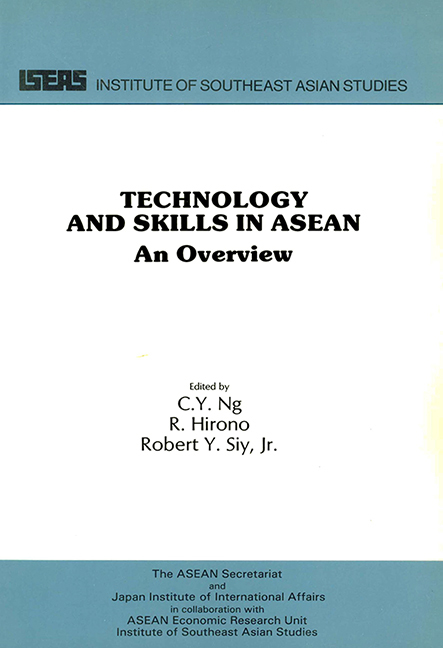Book contents
- Frontmatter
- Contents
- Foreword
- Preface
- PART ONE ASEAN OVERVIEW
- Introduction
- 1 Industrialization in ASEAN
- 2 Technology Transfer, Adaptation and Diffusion in Asean: Problems and Issues
- 3 Science and Technology Policies in Asean
- 4 The Experience From Selected Asean Industries
- 5 Conclusions and Recommendations
- PART TWO SECTION 1: JAPANESE OVERVIEW
- PART TWO SECTION 2: JAPANESE EXPERIENCES IN TECHNOLOGY TRANSFER
- The Editors
2 - Technology Transfer, Adaptation and Diffusion in Asean: Problems and Issues
from PART ONE - ASEAN OVERVIEW
Published online by Cambridge University Press: 09 November 2017
- Frontmatter
- Contents
- Foreword
- Preface
- PART ONE ASEAN OVERVIEW
- Introduction
- 1 Industrialization in ASEAN
- 2 Technology Transfer, Adaptation and Diffusion in Asean: Problems and Issues
- 3 Science and Technology Policies in Asean
- 4 The Experience From Selected Asean Industries
- 5 Conclusions and Recommendations
- PART TWO SECTION 1: JAPANESE OVERVIEW
- PART TWO SECTION 2: JAPANESE EXPERIENCES IN TECHNOLOGY TRANSFER
- The Editors
Summary
Multinational firms, because of their dominance in the world economy and their capacity for technology generation are seen as potential contributors to the industrial development of the ASEAN countries. They are considered a major source of investment funds and of production technology. Although it is generally recognized that the involvement of multinational firms in ASEAN has resulted in employment creation and in the upgrading of technological capacities, there are several issues that have been raised about the net impact of the capital infusions of the multinational firms and their effectiveness as technology transfer agents.
Multinational Firms as Agents of Development
Infusions of capital from multinational firms can be evaluated in terms of direct and indirect income and employment generation effects. Employment creation as a result of capital investments is certainly a positive factor. However, this contribution must be weighed against the possibility of reducing jobs in traditional industries that are displaced by more efficient manufacturing processes. Jobs may also be lost when investments are made in labour-saving equipment.
Indirect effects may be derived through the development of forward and back-ward linkages with other industries and through the generation of additional income and, therefore, effective demand, both of which act as stimuli for increased production and consequently greater employment within the economy. These indirect effects, however, are difficult to measure precisely.
The potential income expansion benefits may be lost if income either drains from the country through increased consumption of imports, especially luxury commodities, or through the repatriation of funds in the form of dividends, interest, royalties, management fees, and hidden transfers through the overpricing of goods and services provided by the multinational firm to its local affiliate.
Other potential benefits that can be derived from multinational firms are related to technology transfer. It is, however, in the area of technology transfer that much of the controversy over multinational firms is centred, and that the avenues for deliberate policy are less clear.
- Type
- Chapter
- Information
- Technology and Skills in ASEANAn Overview, pp. 19 - 24Publisher: ISEAS–Yusof Ishak InstitutePrint publication year: 1988

